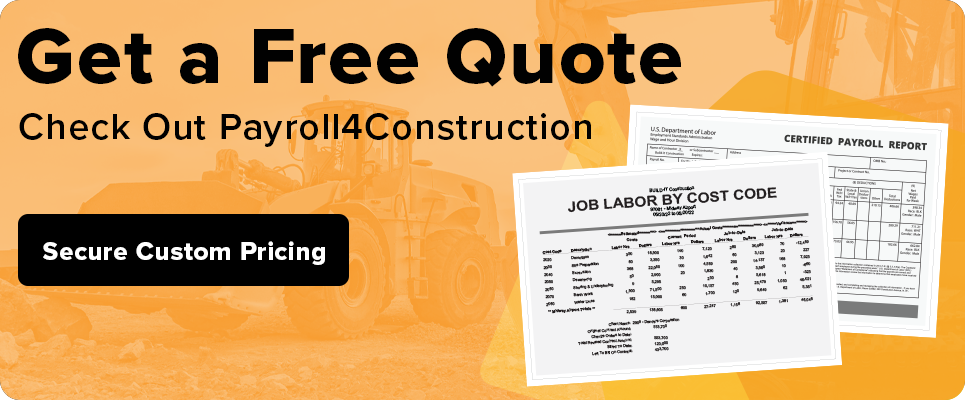Construction Union Payroll Changes

July 11, 2024
For many construction businesses, hiring unionized workers is an effective way to build a well-trained workforce. However, because of the diverse nature of unions and collective bargaining agreements, payroll-related rates and benefits are subject to frequent changes and can be a challenge to track and manage.
What’s additionally tricky is that the union payroll and all union reports are expected to reflect these changes immediately, so it’s important for employers to understand and handle any and all alterations in union payroll requirements.
Furthermore, if a business performs work with multiple trade-specific unions, they will need to accommodate each individual union.
Whether you’re directly impacted by these shifts, or are interested in unionized work, we deep dive into the complex rates and reporting requirements to help you navigate these changing times.
When do Construction Union Rate Changes Occur?
Most unions update their packages biannually on January 1st and July 1st. However, there are some labor unions that do not and may have different reoccurring dates. Because each union functions individually, there is no set standard that all unions will follow. It is up the employing business to track and comply with payroll changes made on union stipulated dates.
When these changes occur, unions will notify contractors in a variety of ways, typically sending notifications for biannual changes in advance of 2-3 months to allow time for businesses to adjust their payroll systems.
However, this period will vary from union to union, with notifications being sent through written notices and letters or formal emails. For non-regularly scheduled payroll changes, unions may organize a joint meeting to discuss changes with the contractors.
If details on union requirements for reoccurring payroll changes have not already been provided by the union, a contractor can reach out and request any schedule information.
What do Construction Union Rate Changes Look Like?
Changes to deductions, fringe benefits, wage rates and other payroll related union packages, aren’t standardized or mandated but are at the discretion of that specific union. These changes generally apply to all members covered but can have certain stipulations or be aimed toward a specific group or trade within that union.
Each union acts independently, often following their own schedule and structure to meet agreements, especially between differing trades. Therefore, percentages and rates vary from union to union, as each act based off their own consensus and evaluation.
The raises are typically made to deductions, such as union dues, and fringes, which can include payment rates towards healthcare and other benefits.
Why do Construction Unions Change Their Rates?
Most unions, as noted previously, will update rates for a variety of reasons, including:
- Market competitiveness
- Economic shifts
- Demands from members
- Changes in government legislation
Most often, these rates will increase to compensate for any changes in the cost of living or to keep the union attractive to skilled workers.
There are no official state or federal regulations focused on payroll-related changes for unions, so it is at the discretion of each union to decide if and when to revise or update them.
How do Union Changes Impact Your Construction Payroll?
When contractors are notified of union payroll changes for their employed members, it is important that they carefully review and understand new or updated agreements. Complying with union requirements is necessary to retain their members and will often affect how a business performs payroll processing.
Depending on the changes made, contractors using payroll software will need to update and modify information and data fields to reflect changes, such as increased wage rates or altered benefits. Any adjustments to a unionized members salary or hourly rate will need to be reflected accurately in their paystub and records complying with union deadlines.
For manual payroll record keeping, contractors are still expected to file and calculate changes accordingly. It can, therefore, make it a challenge for contractors to keep up with any unpredictable or complex union payroll alterations.
How Can a Construction-Specific Payroll Service Help?
Because unions have no official standard for when and how changes are made to payroll-related packages, it can be difficult and confusing to track and meet their member requirements. Additionally, if a business is working with multiple unions, their dates, percentages and rates could differ drastically.
With the help of a construction-specific payroll service, handling union payroll can be made simple, taking the burden off the contractor. These payroll services can handle union payroll reporting, fringe tracking and calculating plus other construction payroll complexities like certified payroll and multi-state processing.
Many construction-based payroll services also have a longstanding history in the industry, with invaluable knowledge of unions and how to comply with the diverse variety of complicated agreements, schedules and regulations.
At Payroll4Construction, we provide all these services and more, ready to help your business navigate and succeed in the world union payroll.
See how Payroll4Construction handles union rate changes in the video below:
Share Article
Keep on current news in the construction industry. Subscribe to free eNews!


